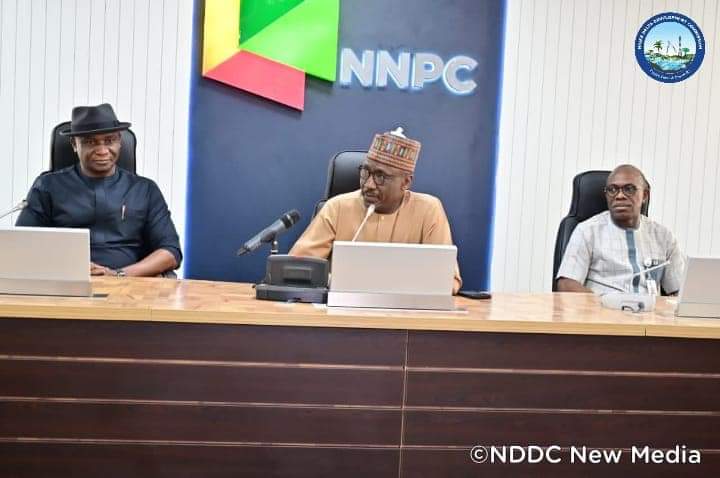Business
NNPC Begin Oil Drilling In Nasarawa, March 21

The Nigeria National Petroleum Company Limited (NNPC Ltd) will begin drilling of the first oil well in Obi/Keana, Nasarawa State, on March 21.
Group Chief Executive Officer of NNPC Ltd., Malam Mele Kyari, made the disclosure when he led Management of the Company on a courtesy visit to Governor Abdullahi Sule in Lafia.
Kyari said the company began exploration activities in the State in 2010 and has technically found petroleum environment in the State.
“We have seen a great potential for finding hydrocarbon in Nasarawa State and to confirm this, we are going to start drilling on March 21.
“We are very optimistic that it would be a successful exercise. It will not end there, once you find oil, you do further works to develop it not just for the benefit of the community around it but for Nasarawa State and the Country,” he said.
Noting that the exploration would not be limited to the current Obi/Keana location, Kyari said, “once we test this prospect, it opens new roads and we have seen other great prospects across many parts of the State. This will herald history and bring value to all of us”.
The Group CEO thanked the government and people of Nasarawa State for the cooperation and support so far and called for its sustenance.
“Peace and cooperation is essential in oil exploration and we have seen enormous cooperation in this respect – we have seen no danger, no risk to our operation from all stakeholders in our area of operation and we thank them for that”, he said.
He said the company would continue to do its best to bring immediate value to the host community and ultimately to the wider society when oil was found in commercial quantity.
Responding, Governor Sule thanked the NNPC Ltd. boss and his team for the visit and for what they were doing in the State.
He also appreciated the people in the area for their support so far, while urging them to sustain the peace in the area and across the state.
Sule identified insecurity as a major challenge to oil exploration in the country, calling on the people of the state to ensure they maintain peace and support the company for the project to succeed.
He expressed optimism that the drilling of the oil well, named “Ebenyi-A” would be the first in the North Central zone of the country and would bring lots of benefits to Nasarawa State.
In his remarks, Emir of Lafia, Retired Justice Muhammad Sidi-Bage, reassured the NNPC Ltd. on behalf of the people of utmost support towards the success of the project.
“On behalf of our people, we want to say that you will find peace, we have been known for being peaceful, kind and loving. You will not have any reason to feel otherwise within the period of your operation in the state,” Sidi-Bage said.
Also speaking, Sophia Mbakwe, Managing Director, NNPC Energy Services Limited, said the assurances from the government and stakeholders in Nasarawa State was critical to the operation of the company.
“For the right to operate, we need the cooperation, support and blessing of the Governor and the community, and that we have gotten today.
“The intent is that it’s going to benefit both parties and we want to go there to ensure no harm to people, no harm to the environment and be able to commence drilling as planned on March 21,” she said.
The Tide’s source reports that the Mr Muktar Zanna, Executive Director, Frontier Exploration Services of the company had led a team other Executive Directors of the Company on courtesy visit to various Taditional Rulers in the area with hydrocarbon prospects in the State to get their support.
Some of the traditional rulers visited included Alh. Aliyu Dangiwa-Orume, Osuko of Obi; Alh. Abdullahi Agbo, Osana of Keana; Alh. Umar Apeshi, Osoho of Olosoho (Agwatashi), as well as Retired Justice Muhammad Sidi-Bage, Emir of Lafia.
Business
NCDMB, Jake Riley Empower 250 Youths On Vocational Skills

Business
NUJ Partners RSIRS On New Tax Law Education

Transport
Nigeria Rates 7th For Visa Application To France —–Schengen Visa

-

 Sports1 day ago
Sports1 day agoArsenal Women End Man City’s Invincibility
-

 Sports1 day ago
Sports1 day agoU-20 WWC: Falconets claim qualifier win
-

 Sports1 day ago
Sports1 day agoInsurance Deepen Enyimba’s Trouble
-

 Environment1 day ago
Environment1 day agoRivers State Government Suspend Fire Service Collection Levies
-

 Environment1 day ago
Environment1 day agoLASEMA pushes attitudinal change to cut fire outbreaks in Lagos
-

 Sports1 day ago
Sports1 day agoYouth Olympics preparation Gears up
-

 Sports1 day ago
Sports1 day agoTornadoes Set For NPFL exit over Stadium Ban
-

 Sports1 day ago
Sports1 day agoCologne Youth Team Set Crowd Record

